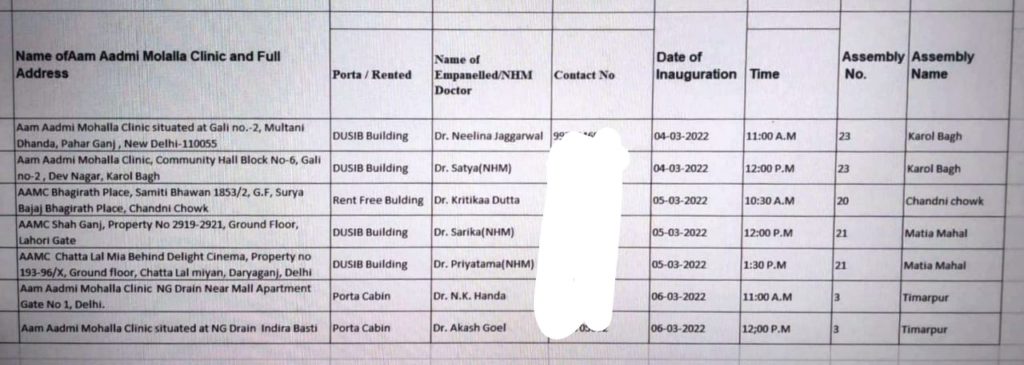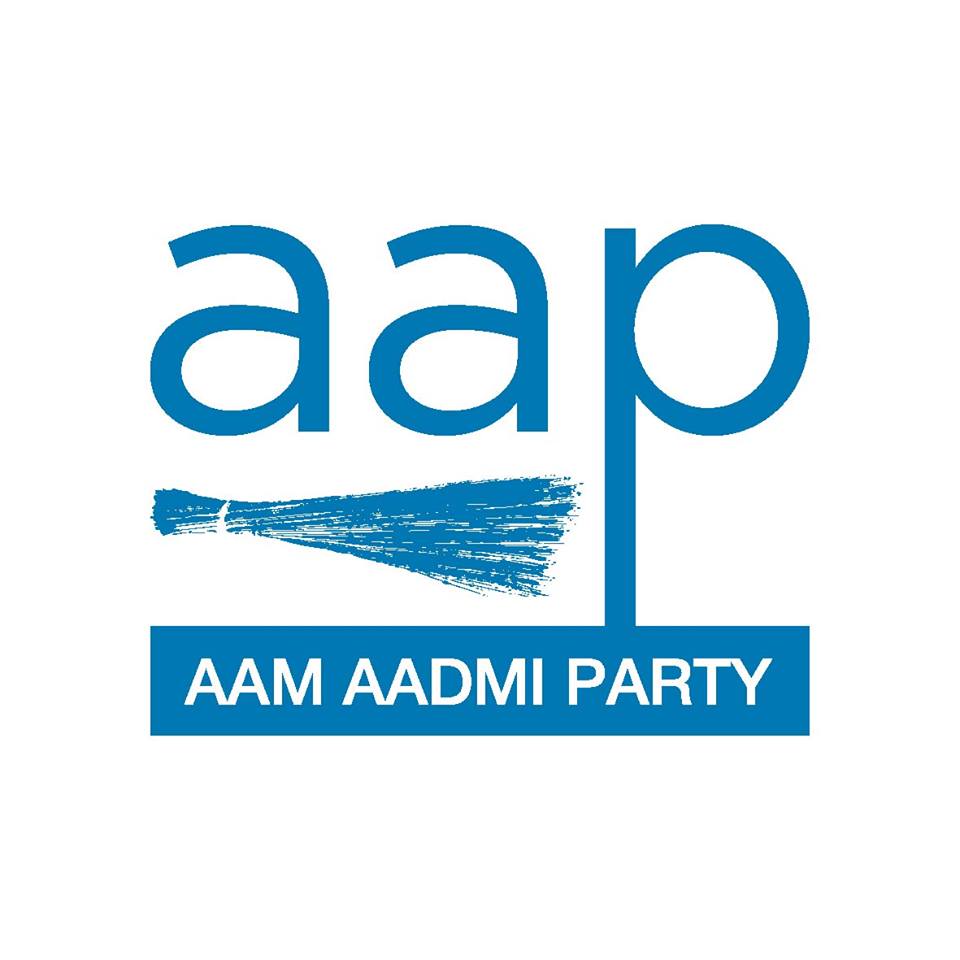

Guaranteed Treatment, Free Treatment assured
The AAP Delhi Government tries to ensure Quality Health for all through a patient-centered 3-tier healthcare model.
It strives to provide Guaranteed, Free treatment to all Delhi citizens.
- Free medicines – All medicines are free in all Delhi government medical facilities. While Mohalla Clinics offer the essential 125 free medicines, multi-speciality hospitals were offering 1390 medicines in 2018 against the National List of Essential Medicines which has only 376 medicines.
- Free medical tests– All medical tests are free in all Delhi government hospitals and clinics. The Delhi government has also tied up with 23 empanelled private labs to offer free medical tests to Delhi residents when referred by any Delhi government hospital or clinic.
- Free surgeries – The Delhi government has launched a scheme for all the residents of Delhi, which offers 86 free surgeries including heart by-pass surgery, as well as 1016 surgical, 123 oncology and 10 neonatal procedures and six medical packages. The Delhi government has also tied up with 31 private centres and 57 private hospitals to offer free surgeries to Delhites on the recommendation of Delhi government hospitals, if the waiting period is more than 30 days in Delhi government-run hospitals.
- Free treatment for accident and burn victims at private hospitals.

(Source: Pg. 46, DDC Performance Report, 205-2019)

3-tier HealthCare Model
The AAP Government brought in a unique 3-tier health care model – ‘Mohalla Clinics’, Polyclinics and Multi-speciality Hospitals – in place of the old 2-tier model consisting of dispensaries and Multi-speciality hospitals only. The 3-tier healthcare system is applauded worldwide.
“The country’s development depends on the quality of its human resource, its people. And the quality of the human resource depends on their access to high-quality education and healthcare. Delhi’s model of governance addresses this fundamental need…
…In a country like India where people cannot afford high insurance premiums, we need a Health Assurance model and not a Health Insurance model.
That is what we are developing through a three-tier healthcare program.
In the first tier is a re-imagined primary health care unit, the ‘Mohalla Clinic’. An average primary care unit costs close to Rs 5 crore to build, while the Mohalla Clinic, a temporary air-conditioned structure within the community costs about Rs 20 lakhs instead!
We are now building 25 Mohalla clinics at the cost of one erstwhile dispensary. With more than 160 such clinics functioning throughout the city, the patients who were crowding the large hospitals for primary care have been diverted to local clinics.
The most striking part of this story is that in all of these clinics we provide consultation, diagnostic testing and medicines free of cost at a cost to the government of just over Rs 100 per patient. In contrast, a consultation at a large government hospital costs us more than Rs 1000.” — Manish Sisodia, Delhi Dy CM, talking about Delhi’s Healthcare Reform Model (Link) in his address at India Conference, Harvard University, Feb 2018 (Link)
The 3 tiers of Delhi Healthcare model are:
- Tier-1 Aam Aadmi Mohalla Clinics (AAMC) – to provide quality primary healthcare accessible within the communities in Delhi
- Tier-2 Polyclinics – focuses on secondary healthcare in the form of OPD consultation by specialist doctors, including diagnostics.
- Tier-3 Government Hospitals and Private Public Partnership with NABC approved private hospitals
According to Dy CM Manish Sisodia, as of 10th March 2021, Delhi has
- 38 multi-speciality hospitals
- 181 allopathic dispensaries
- 496 Aam Aadmi Mohalla Clinics (Source: Pg. 11, Status Report of Outcome Budget, 2020-21),
- 27 polyclinics, 60 seed primary health centres
- 46 ayurvedic dispensaries
- 22 unani dispensaries
- 107 homeopathic dispensaries
There are 22 mobile health clinics covering 78 day-shelter homes and 311 night-shelter homes in Delhi, along with 61 school health clinics, providing preventive and curative health care services to the citizens of Delhi.

Tier-1 Aam Aadmi Mohalla Clinics (AAMC)
Aam Aadmi Mohalla Clinics (AAMC) were designed as a low-cost innovation (capex of about ₹20 lakhs per clinic) to provide quality primary healthcare accessible within the communities in Delhi at their doorsteps.
The clinics, functional on all days except Sunday, provide basic medical care for common illnesses like fever, diarrhoea, skin problems, respiratory problems, first aid for injuries and burns, dressing and management of minor wounds and referral services.
“While some clinics work from 8 am to 2 pm, those with double shifts are running between 7 am and 1 pm and 1 pm to 7 pm with two different sets of staff members, including doctors.” – a Delhi Health Department official (Link)
- 496 AAMCs had been built upto Dec 2020, with a total of 1000 planned. (Source: Pg. 11, Status Report of Outcome Budget 2020-2021).
- “Swasthya ATMs”, or medicine vending machines, have been installed at mohalla clinics.
- 125 free medicines and 212 lab tests available for free at AAMCs. (Source: Pg. 8, DDC Performance Report, 2015-19)
- On an average, each AAMC handles 97 patient visits per day. (Source: Pg. 11, Status Report of Outcome Budget 2020-2021)
- 2 crore OPDs have been handled at AAMCs since 2015 (upto Nov 2019).
- Mohalla clinics in Delhi reduced OPD caseload at hospitals by 20 per cent.

(Source: Pg. 47, DDC Performance Report 2015-2019)
Anmol Gagan Mann, MLA, Kharar, Punjab, visited a Mohalla Clinic in Delhi.
Feedback on Mohalla Clinics.

AAMC – A Low-Cost Innovation For High Quality Healthcare
- It is a pre-engineered insulated box, covers 60 sq. meters.
- It can be relocated and air-conditioned.
- The average capital expenditure is Rs 20 lakhs in comparison with setting up a dispensary that costs 1 Crore.
- 212 lab tests have been provisioned because of cost effectiveness of Public Private Partnership (PPP) model. (Source: Pg. 8, DDC Performance Report, 2015-19)
- The goal is to have a mohalla clinic within 1 km of any location to serve about 10,000 to 15,000 people.

(Source: Pg. 46, DDC Performance Report 2015-2019)
Some mohalla clinics are in porta-cabins (as shown above) and others in rented premises. The latest ones are portable and have been designed from shipping containers. The Architecture company behind the design won an award from Indian Buildings Congress.

(Source: NDTV – Link)

Mahila Mohalla Clinics
In March, 2021, Finance Minister Manish Sisodia said that 100 Mahila Mohalla Clinics will be set up in the first phase, from the financial year 2021-22.
Creating these 100 ‘Mahila Mohalla Clinics’ will allow every woman in the city access to special services of gynaecologists and related diagnostic tests and the number of clinics will be increased to ensure that there is at least one clinic in each ward.

(Source: Tweet by Shaleen Mitra)
How Mohalla clinics have improved healthcare in Delhi
Delhi residents spend 9.8% of their household income on health every year on an average, according to a report by the non-profit Praja published in November 2019. One of the reasons is the lack of health insurance, due to which 90% of India’s poorest pay for medical expenses from their own pocket, IndiaSpend reported in December 2019. The average medical expenditure per hospitalisation in a private hospital (Rs 31,845) is seven times that in a government hospital (Rs 4,452).
According to an article by Scroll, “Globally, a person visits the hospital three times a year on average, compared to one visit a year in India, according to the research paper published in January 2020 in the Journal of Family Medicine and Primary Care. After Mohalla Clinics were set up in Delhi, a person visited the doctor 5.6 times per year, on average, the paper found.”

Aam Aadmi School Clinics / School Health Clinics
The Aam Aadmi School Clinic project is currently being executed in 20 schools of the Delhi government and will be further extended to cover more schools.
It was inaugurated on 7 Mar 2022 by Deputy Chief Minister Manish Sisodia and Health Minister Satyendar Jain at Sarvodaya Kanya Vidyalaya in Moti Bagh, Delhi.
The clinics are part of a pilot project implemented by the Delhi government in collaboration with The Hans Foundation and with the support of CSR initiatives of the Indraprastha Apollo Hospital Delhi, BSES Rajdhani Power Limited and the BSES Yamuna Power Limited.
In each clinic, Doctors, Psychologists and ANM (Auxiliary Nursing and Midwifery) Nurses will be present. All facilities will be provided under one roof. Students can be open and frank with their issues. If a student faces any problems, ANM refers the student to the Doctor and/or to the Psychologist. Necessary consultation is then done and medicines provided if required. Teachers too can refer students to Psychologists to help them resolve any issues.




(Sources: Tweets by Aam Aadmi Party, DaaruBaazMehta)
“The Aam Aadmi School Clinics are an extension of Mohalla Clinics and have been started with the aim of providing biannual health checkups to our school students. Apart from this, for the first time, the focus will be laid on mental well-being along with physical health. A healthy mind will contribute to a healthy society and ultimately a healthier nation,” Deputy Chief Minister Manish Sisodia said.

Tier-2 Multi-Speciality Polyclinics
Tier-2 multi-speciality Polyclinics focus on secondary healthcare in the form of OPD consultation by specialist doctors, including diagnostics.
- 27 polyclinics are operational, total 100 planned.
- Public Private Partnerships with NABH-accredited private hospitals and labs for medical tests like MRI, PET scan, x-ray, ECG and ultrasound are provided completely free of cost
The number of people taking diagnostic tests saw a 10-fold increase in just 3.5 years between 2016-17 and Sep 2019. 15 lakh tests were done in just 6 months of FY 2020 (up from about 1.51 lakh tests done in FY 2017) (Source: Pg. 8, DDC Perf Report 2015-2019)

Tier-3 Speciality Government Hospitals
Tier-3 Speciality Government Hospitals provide free tertiary care with an assurance that any Delhi resident can get any life-saving surgery done within 30 days – from a Government or a private hospital.
The Delhi government bears the expenses for emergency aid, surgeries and two-week hospital stay in economy or similar budget-category beds and wards.
- As of 10th March 2021, there were 38 hospitals in total under Delhi Government.
- If a patient is waitlisted for over a month for a surgery in Delhi government hospitals, he/she will be referred to any of the 31 private centres and 57 empanelled private hospitals (numbers as of Feb 2020).
- As per outcome (OPD, IPD, Casualty), around 2.09 crore patients availed of healthcare services in 32 Delhi Government Hospitals in the period Apr-Dec 2019.(Source: Pg.11, Status Report of Outcome Budget, 2019-20)
- As of Feb 2020, 1,155 surgeries and procedures, and 133 diagnostic tests had been availed cashlessly in private empanelled facilities.

More Info

(Interview with Akshat Bhatt, the brains behind portable Mohalla Clinic)
Article: Delhi’s Mohalla Clinics hold the potential to significantly improve access to Quality Healthcare.

(Source: Tweet by Satyendar Jain)
Feedbacks on Mohalla Clinics. (Source: Tweets by Krishna, Murali)

Article on School Health Clinic by Shaleen Mitra

School Health Clinic Poster






 (@krishna76_h)
(@krishna76_h)  दिल्ली के 20 सरकारी स्कूलों में शुरू हुआ School Health Clinics
दिल्ली के 20 सरकारी स्कूलों में शुरू हुआ School Health Clinics